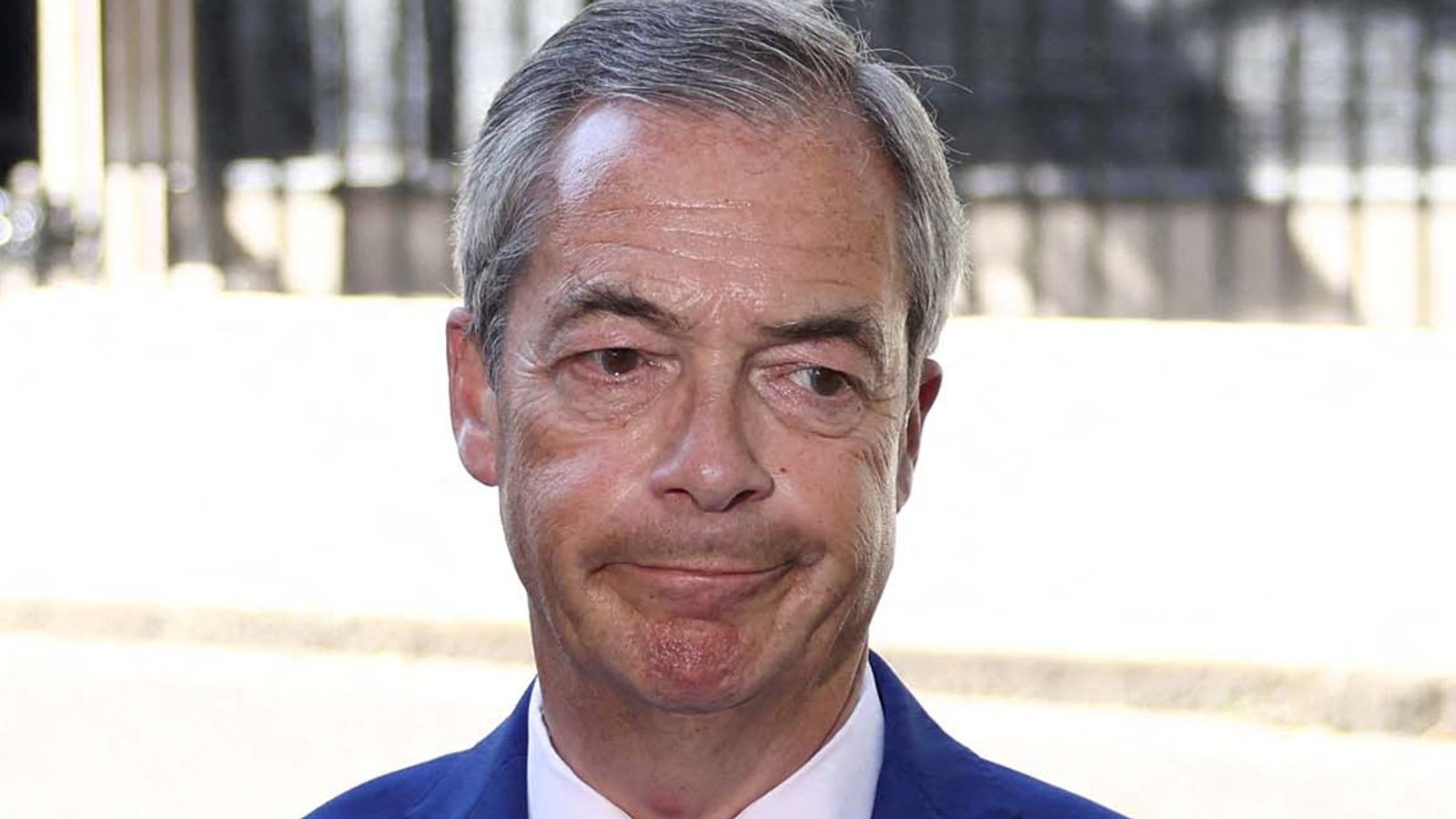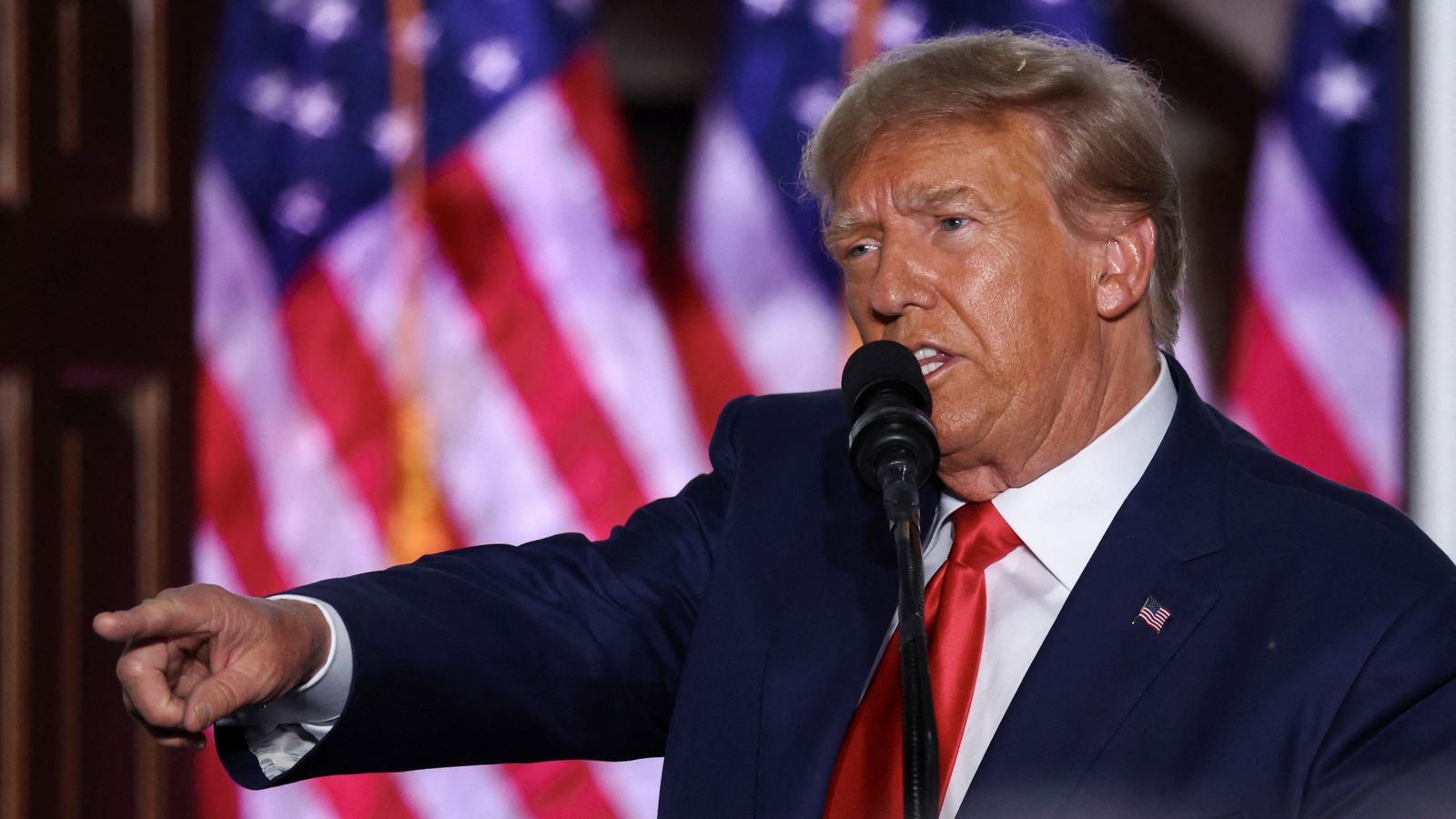Nigel Farage has claimed his bank account was closed because his views and friendships with the likes of Donald Trump and Novak Djokovic “do not align” with his bank’s “values”.
The former Brexit Party leader says he has a 40-page document that proves Coutts “exited” him because he is regarded as “xenophobic and racist” and a former “fascist”.
He previously claimed that a subject access request he made to the bank, whose clients include members of the Royal Family, reveal it regards him as a PEP or ‘politically exposed person’.
Coutts has said that decisions around account closures “are not taken lightly” and “commercial viability, reputational considerations and legal and regulatory requirements”.
Please use Chrome browser for a more accessible video player
What is a PEP?
A politically exposed person (PEP) is someone who holds or has held public office and therefore may be more susceptible to bribery or corruption.
According to the Financial Conduct Authority (FCA): “A PEP may be in a position to abuse their public office for private gain and a PEP may use the financial system to launder the proceeds of this abuse of office.”
Banks face Treasury clampdown in Farage account closure row
‘Political discrimination’: Senior Tories round on Coutts over Nigel Farage bank account closure
Nigel Farage claims Coutts bank account was shut down over his ‘values’
Examples include heads of state, ministers, members of parliament, members of supreme or other courts, board members of central banks, and high-ranking officers of the armed forces.
Relatives, friends and associates of the above can also be considered PEPs, because, the regulator says: “Likewise a PEP’s family or close associates may also benefit from, or be used to facilitate, abuse of public funds by the PEP.”
Are banks allowed to close their accounts?
If someone is identified as a PEP the Money Laundering, Terrorist Financing and Transfer Funds Regulations (2017) require their bank or financial institution to take “enhanced due diligence measures”.
These include getting senior managers to approve the business relationship, regularly monitoring it, and establishing where their money is coming from. They will then be classed as either low or high-risk.
Lower-risk PEPs will only require basic monitoring, but higher-risk ones may prove too unsafe.
There has been widespread criticism of the current regime around PEPs. As a result in 2017 the FCA carried out a review in which it reinforced the right of PEPs to retain their bank accounts.
It said: “The FCA expects that a firm will not decline or close a business relationship merely because that person meets the definition of a PEP.
“A firm may, after collecting appropriate information and completing its assessment, conclude the risks posed by a customer are higher than they can effectively mitigate.
“Only in such cases will it be appropriate to decline or close that relationship.”
Read more:
What happened to Nigel Farage’s bank account?
Shapps backs Farage in Coutts row
Accounts shouldn’t be shut for political reasons – UK finance
But Mr Farage’s case has brought further criticism that the 2017 review didn’t go far enough.
The Treasury has said last month’s new Financial Services and Markets Act will ensure “the right balance can be struck between the customer’s right to free speech and the bank’s right to manage commercial risk”.
And Sky News has learned that further secondary legislation due to be unveiled soon will require banks to give customers three months’ notice of account closures and to provide a full explanation.
In its statement, Coutts said Mr Farage was “offered alternative banking arrangements within the wider group” – which is owned by NatWest.
Please use Chrome browser for a more accessible video player
Why could Nigel Farage be considered a PEP?
Nigel Farage hasn’t held political office as an MEP since the UK left the EU in 2020 and he ceased being leader of the Brexit Party (now Reform UK) in 2021.
The Brexit Party didn’t win any seats at the last general election in 2019 and Reform UK only won a handful of seats on Derby City Council in this year’s local elections. UKIP, its first name, lost all its councillors – down from 500 in 2016.
According to the FCA’s latest guidance, the definition of a PEP as a “member of governing bodies of political parties… only applies to political parties who have some representation in a national or supranational parliament”.
But it adds that if the PEP is “no longer entrusted with a prominent public function” they should still be subject to enhanced checks for “at least 12 months”.
When Mr Farage first claimed his Coutts account had been closed earlier this month, he said it could have been because Labour MP Chris Bryant claimed he received money from Russia.
Using parliamentary privilege, Mr Bryant told the House of Commons Mr Farage was paid £550,000 by Russian state broadcaster RT.
Mr Farage denies this and Mr Bryant has not repeated the claims outside the Commons.
Please use Chrome browser for a more accessible video player
Anyone with links to Russia could be considered a high-risk PEP as it is “associated with high levels of corruption, armed conflict, non-democratic forms of government” among other criteria set out by the FCA.
Martin Cheek, managing director of digital compliance platform SmartSearch, says Mr Farage is “undoubtedly” still a PEP.
But he says while the final decision is with Coutts, “it’s important for banks to use their information to make informed decisions”.
“This helps prevent indiscriminate ‘sweeping up’ of low-risk PEPs in account closures or other restrictive measures,” he tells Sky News.
Who else has had problems?
Following Mr Farage’s initial Twitter posts about his Coutts account, Daily Mail columnist and historian Dominic Lawson claimed his daughter had been denied two bank accounts because her grandfather was the late Nigel Lawson – the Conservative chancellor – and his wife’s brother is a viscount.
He described the decisions – by Barclays and HSBC – as “absurd and perverse”.
Mr Cheek says that PEPs have “received increased notoriety” following Russia’s invasion of Ukraine – but they can come from “all countries and regimes”.
He notes that unlike the former Brexit Party leader, they “often remain faceless names on financial accounts”.
The Financial Service and Markets Act now distinguishes foreign PEPs from domestic ones to “allow the lower risk of domestic PEPs to be appropriately reflected” in FCA guidance.
Speaking to Sky News energy security minister Grant Shapps and Treasury minister Andrew Griffiths put pressure on the FCA to “get a grip” of the issues.
An FCA spokesperson said: “While who banks do business with is ultimately a commercial decision for them, they should treat people fairly and ensure they meet their responsibilities under equality legislation.”












